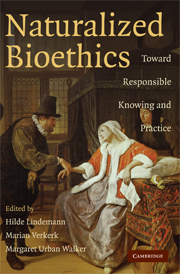Book contents
- Frontmatter
- Contents
- Contributors
- Acknowledgments
- Naturalized Bioethics
- Introduction: Groningen Naturalism in Bioethics
- I RESPONSIBLE KNOWING
- II RESPONSIBLE PRACTICE
- 7 Motivating Health: Empathy and the Normative Activity of Coping
- 8 Economies of Hope in a Period of Transition: Parents in the Time Leading Up to Their Child's Liver Transplantation
- 9 Consent as a Grant of Authority: A Care Ethics Reading of Informed Consent
- 10 Professional Loving Care and the Bearable Heaviness of Being
- 11 Ideal Theory Bioethics and the Exclusion of People with Severe Cognitive Disabilities
- 12 Epilogue: Naturalized Bioethics in Practice
- Bibliography
- Index
9 - Consent as a Grant of Authority: A Care Ethics Reading of Informed Consent
Published online by Cambridge University Press: 05 June 2012
- Frontmatter
- Contents
- Contributors
- Acknowledgments
- Naturalized Bioethics
- Introduction: Groningen Naturalism in Bioethics
- I RESPONSIBLE KNOWING
- II RESPONSIBLE PRACTICE
- 7 Motivating Health: Empathy and the Normative Activity of Coping
- 8 Economies of Hope in a Period of Transition: Parents in the Time Leading Up to Their Child's Liver Transplantation
- 9 Consent as a Grant of Authority: A Care Ethics Reading of Informed Consent
- 10 Professional Loving Care and the Bearable Heaviness of Being
- 11 Ideal Theory Bioethics and the Exclusion of People with Severe Cognitive Disabilities
- 12 Epilogue: Naturalized Bioethics in Practice
- Bibliography
- Index
Summary
The medical intervention is scheduled. The doctor visits the patient and explains again the procedure. She draws a picture of what she is going to do. She mentions the risks entailed in the procedure. She asks, “Have I answered all of your questions?” The patient nods. The doctor hands the patient a form to sign. “Could you sign this form, then? It indicates that we have discussed the procedure and you have consented to it.”
This ritual of consent is performed thousands of times every day in hospitals, doctor's offices, and other medical settings. Yet what does this ritual really mean? As Ruth Faden and Tom Beauchamp (1986) argue, there are two elements to the traditional way to view consent. It is both an exercise of the patient's autonomy and an institutional arrangement whereby the medical actors can demonstrate that they had authority to act (Cates 2001). These two elements are separated into an ethical concern, focused on the individual patient, and a legal concern, focused on the institution. But suppose, as a naturalized ethics might suggest we should, we try to put these two pieces together? For the most part, discussions of consent focus more on the concern for patient autonomy than on the ways in which they authorize actions. While consent has made health care providers more sensitive to the dangers of paternalism, if we focus on both aspects of consent, we will see something else.
- Type
- Chapter
- Information
- Naturalized BioethicsToward Responsible Knowing and Practice, pp. 182 - 198Publisher: Cambridge University PressPrint publication year: 2008
- 6
- Cited by



